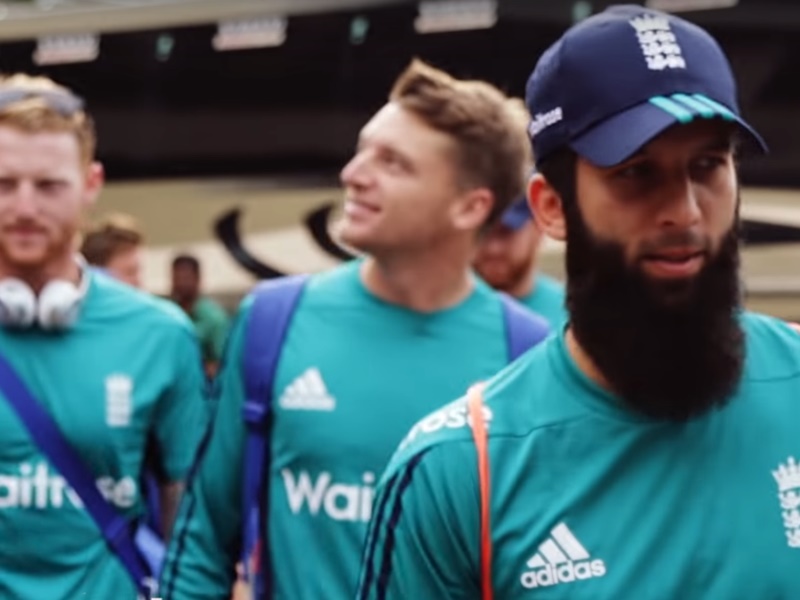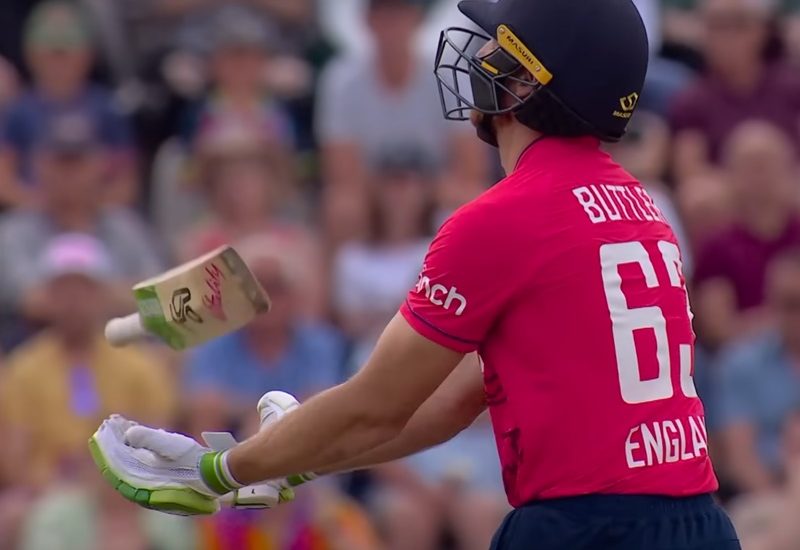England have just finished playing Australia in a one-day series. The first match came three days after the T20 World Cup final and the man who went on to captain England in the second game called that scheduling “horrible”. With the bare minimum diplomacy, England’s coach said the series was one his team would “have to be really professional about.” Now the actual captain has described it as ‘a good example of how not to keep bilateral cricket relevant’.
We sometimes ponder the whereabouts of the threshold at which cricket concludes, ‘okay, this is getting ridiculous now – this is simply not a thing that anyone wants any more’.
We are, first and foremost, a fan. We like cricket. We love cricket. We have been writing a whole bloody website about cricket for 16 years. And we love international cricket most of all.
One of the things we have written for this website is a calendar that pares away great swathes of international cricket that we are now consciously trying to ignore. It is not that we do not love these matches; it is that these matches actually diminish our fundamental love of the game. They actively drain our enthusiasm, bleeding the capacity for excitement from us so that there’s less available in the matches we do love.
And again: we’re a fan.
The players’ view
But no-one’s paying attention to the King Cricket Essentials Calendar when they’re scheduling series. We’re insignificant. As long as there are enough people who are kind of half-paying attention, an international cricket series is worth staging. So series get staged.
The players, when taken as a whole, are broadly okay with this. For a lot who would otherwise only be on the cusp of international selection, an extra game here or there tips them into fulfilling a lifetime ambition of playing for their country. Plus everyone gets paid.

But then there are the senior players; the successful players; the ones who’ve reached the summit of the game and found it to be a great sprawling plateau where they’re obliged to cover a surprising amount of ground. These players tend to reach a point where they manage the situation themselves and start ‘specialising’ (which is really just a euphemism for giving up formats they’d actually quite like to continue playing if that were in any way a realistic undertaking).
> Separate teams? What might a world of cricket format specialists actually look like?
But by and large everyone toes the party line: Every series is important, somehow. Every series is an opportunity, for someone.
But England really haven’t treated this one-day series against Australia like that.
“We always saw that series as being something that we will have to be really professional about,” said coach, Matthew Mott – which was not exactly giving it the hard sell.
“We have to do it, and while we’re here we might as well do it,” said Moeen Ali, sounding similarly enthused.
And now, in the aftermath, captain Jos Buttler has had his say too.
Speaking to the BBC, Buttler concluded: “I think lots of people are talking about how to keep bilateral cricket relevant and this series is a good example of how not to do it.”
Even the broadcasters weren’t into it. BT Sport had the rights, where pundit Steve Harmison summed it up as: “Meaningless cricket played in a meaningless way. Fulfilling the fixtures – that’s all it did.”

So where is the line beyond which we can all agree, “this is getting ridiculous”?
Where exactly is that “this is simply not a thing that anyone wants any more” threshold?
England have just played Australia and collectively given a pretty strong impression that they were only really doing so under sufferance. Is that the kind of cricket you want to watch? Do you truly believe that as ‘international cricket’ these matches carry equal weight to those that take place in a World Cup?
Buttler continued: “One of the biggest things is having overlapping series. We’ve got a group of players preparing for a Test series in Pakistan and we’ve got another group playing here at the same time. In the New Year a Test match finishes one day, and an ODI series against Bangladesh starts the next.
“I feel a bit for the players to be honest, the ones who are young and coming into the game at the moment, you want to play all formats but I don’t think the schedule allows you to.”
This whole situation is what is known as “a bollocks”. Buttler suggests spreading ICC tournaments out a bit (maybe not having a World Cup every year, say) – but that isn’t really enough because the situation is way beyond that. It is in fact “a complete bollocks”. (Pointless T20 leagues are increasingly vying with pointless bilateral series for pointlessness supremacy.)
> How popular are all these Not-Quite-The-IPL franchise leagues actually likely to be?
The people who most love the game say it’s a complete bollocks. The people who play the game say it’s a complete bollocks. Even the broadcasters concede that from time to time certain series are a complete bollocks.
Please stop shaping the whole damn sport around the types of people who’ll always stick a match on the telly in the background if there happens to be one on.
Have these little rays of sunshine arrive in your inbox by signing up to our email.





“In the New Year a Test match finishes one day, and an ODI series against Bangladesh starts the next.”
At this point you may as well drop the pretence and just play the matches simultaneously. Bit of an insult to BD who are pretty good in their own back yard especially… But then it’s also a bit of an insult they so rarely get invited over here too.
I guess the point it stops is the point where it starts costing the organisers through lack of ticket sales.
Sports administrators in general see unable to understand the concept of scarcity value (see: cricketing World Cups every 5 minutes, 48-team football World Cups from 2026 onwards, the ‘Swiss Model’ that the Champions League is going to bring in, etc) but once everyone else is diluting the value of something, the rational thing to do is keep diluting it further until the cost outweighs the money it brings in.
*Seem unable (as in, ‘I seem unable to type coherent comments on my phone with my fat fingers’)
On ticket sales the last odi only had about 10000 in the mcg which was a record low i think
Agreed that money is probably what will do the talking here, possibly combined with players taking more of a stand. But (position of ignorance here) are ticket sales really the main commercial consideration for why fixtures like this go ahead, or is it more about reaching contractual obligations for TV deals or fulfilling scheduling requirements set by the ICC?
I think TV comes into it but ticket sales and TV interest are subject to similar economics.
On the topic of administrators always thinking that ‘more/bigger is always better’, I present the format for the 2024 T20 World Cup: https://www.espncricinfo.com/story/new-format-for-2024-men-s-t20-world-cup-1345824
I actually like the new T20 World Cup format – the idea of big boys entering a World Cup at a later stage of it is equivalent to saying the first half of the competition is just a glorified, very late qualifying tournament. There’s a genuine risk of a financially important nation getting knocked out in the new first round set-up given the potential for upsets in short form cricket, and if the ICC just wanted a ‘bigger’ (more matches, more TV viewers etc) product they could have gone for the ten-team round-robin format they did in the ODI WC – introduced, essentially, as a consequence of exactly that early knock-out risk being realised in a previous edition. Instead they have gone for a ‘bigger’ product in terms of global participation and not fobbing the associates off with a first stage that everyone ignores while the “main” teams play 15-a-side warm-up matches. Since that actually took some balls given the risks involved, I’m prepared to grudgingly pay my respects to the ICC for making that call.
The ticket sales and the TV revenue work very differently economically. I can see the case that broadcasters won’t be keen on product dilution if audiences tail off for cricket matches nobody wants to watch, but if the name of the game is subscription sales (hence holding exclusive rights is particularly valuable) rather than drawing in viewer numbers to sell ads to, the pressure is a bit different. It may even suit broadcasters to have marquee series that people will pay the subscription to get access to plus other content that’s there to give subscribers something extra to watch if they want it, and remove a potential reason/excuse (“there’s nothing in between the main highlights of the calendar”) to cancel the contract. The thing that would be really disastrous is if the whole international game lost meaning/interest – I suspect the scramble to sort out franchise leagues is in part the boards putting some insurance in place just in case the model of international cricket being the main cash cow breaks down – but so long as there are highlights and lowlights, rather than one big formless dreary mess, you’ve got both a hook to sell subscriptions with and filler material to make the deal look less exorbitant. A lot of TV is filler but it doesn’t necessarily mean the model is failing and it’s not surprising that a lot of made-for-TV sport is also, at heart, filler. It’s entirely possible for TV firms to be asking for more content/filler even when they know the audience will be limited. The “contractual obligation tour” is definitely a thing.
The way the pressure gets transmitted to the boards is very different too, since the TV deals pass the risk of the product underperforming onto the broadcasters. The boards as far as I know aren’t entering into risk-sharing agreements where lower viewership cuts their earnings, which is how the stadium audiences affect them (just not so much given the relative magnitudes here – I don’t think anybody would have suggested the 3 Eng-Aus ODIs if the whole affair was premised on ticket sales). There is a risk that the next rights sale won’t earn so much if you mess up the product but that’s a less pressing issue on a day-to-day basis. Could come back to bite you big time if you keep your eye off the ball too long, of course, but how often will the same management team be in place by then? Sleepwalking into oblivion is a route other sports have gone down so there’s no reason to think cricket is immune.
There are two things that surprise me, which indicates I don’t really understand what’s going on. For one thing, a circus of people jetting off all over the place to play pretty meaningless fixtures really ought to have some major environmental pushback but it’s mostly quiet on that front. The flip side of that is there was a not entirely unreasonable “greenwashing” case that could have been presented for England playing Australia – it’s a long way to go and you’re already there so it saves carbon emissions not to have to come back and play them later – but I didn’t notice that card being played. A second surprise for me is that the franchise leagues should increase player power, at least for the better ones, by giving them an alternative way to make lots of money than doing whatever their board tells them. Since the senior players are almost uniformly opposed to the current fixture congestion – as they should be, since the injury risk it presents now poses a bigger potential loss of career earnings than it would have done in the pre-T20 era – you might have thought the boards/ICC would paid them some heed by now. The fact they haven’t is surely telling us something more than just the fact the administrators are greedy and tone-deaf – it presumably says something about the market structure, but I’m not sure what exactly.
I’m going to be a cynic here cos’ it’s the thing I enjoy most.
There is a point to be made about spacing series apart, but perhaps the lack of such spacing stems from the fact that many teams field different players for different formats. In the olden days of yore I believe that the players that played in a test team also played in ODI’s (where the ODI series was the apertif to the test series). That presumably forced the authorities to sensibly space series. Yes, I am aware that the current state of affairs has to some extent forced (the major) cricketing nations to field different players in different formats, but perhaps those cricketing authorities should stand up and say “we can’t field a team for such-and-such over there this week because the players that would make up that team are currently playing over here this week”.
It’s noticeable that this is England-centric. Did Australia think this ODI set was a worthless series? If so, then England really have something to worry about having been utterly thrashed the way they were. Or perhaps Australia did actually take it a little bit more seriously. If so, why?
As regards what is a worthless series, aren’t they all getting that way? I previously whinged about the lack of a full test series, i.e., five matches, an actual cricketing event, not the tiddly two or three matches that seem to be forced upon us to fill a gap between the equally brief and often isolated ODI and/or T20 series, although I still haven’t fathomed out the established pattern of T20 series (although this can now be extended to all formats of the game). The women’s game is in an even worse predicament.
I’ll leave things out like, “I’d gladly play in a worthless ODI series for the amount of pay they get” or “we (the players) are crap, so we’ll say we’re not interested in playing these ‘worthless’ series as the excuse”, as that is far too cynical and shallow for this site.
I think if Australia had made the T20 World Cup final and England had been eliminated in the group stage, the complaints might have been more Aussie-centric and less Anglo-centric
Possibly, but I’m sure the Aussie’s would nonetheless make a fist of it, being on home soil and all. Two (very short) games more and a week longer shouldn’t make that much of a difference in the performance of the two teams. England’s complaints would be more jabbing if they won the series.
I get the impression that the England team just didn’t bother (or really were that bad). The series may have been worthless in many minds, but you’d think they’d still try.
I’m also drifting away from the point. That being the profusion of T20’s and to some extent ODI’s, due to their potential profitability, are disrupting the main stream of cricket, e.g., test series and relevant ODI series (you know, the one’s preceding a test series). The formaility of the game is being corrupted.
You might know that as well as cricket, I have been a lifelong supporter of rugby league. I also (maybe because of confusion) don’t mind a bit of rugby union.
I strongly suspect that there is a cross-over between the administrators of cricket and RU. Certainly they all went to the same school. It must have been at this school where they learned the first lesson of running a sport – don’t allow reality to cloud your ambition. “If you build it, they will come”, said a ghost once in a piece of fiction. Soon afterwards, this was adopted as the business plan of both cricket and RU.
In rugby, the consequence is (now) well documented. Two top level clubs gone, a league that loses £50m every year it is played, a total debt of £500m across the top thirteen (no, twelve, no eleven) teams. But it’s OK. We have built it, so they will come. Eventually. In the meantime, in order to balance the books (that is, balance to the figures given above), the international teams must play almost permanently, right up to the point where the players actually start dying of exhaustion (and concussion).
In cricket, a similar thing is happening. The difference is that it won’t be massive lawsuits from brain damaged players that collapses the whole thing, it will be fans turning away from the game. The test of whether series like this one are damaging is not that they get less than 10,000 turning up to watch, it is that the peripheral interest when the Ashes comes around is gone. “They play Australia every year, don’t they?” says the casual sports fan when asked why he/she isn’t all that bothered about a major test series, followed immediately by, “So it can’t be a big deal.”
All sports have certain events that generate huge interest and cash. In cricket and RU, it is the international version. But assuming that this is infinitely expandable with no limit is a level of stupidity second only to using that assumption as the financial foundation of your sport. “Don’t worry, it will be fine, there’s too much history and support for anything bad to happen,” said a spokesperson for Wasps RFC (est. 1867).
A teenage leg-spinner from Leicestershire in the England Test squad? In this economy?
I read “teenage leg-spinner from Leicestershire” to the tune of “Long-haired lover from Liverpool”.
There, now you all have to deal with that in your heads as well….
Fortunately he won’t be playing for Leicestershire for very long!
Hmmm.
If I truly believed that this is simply schedule overcrowding while international cricket plays catch-up with its broadcasting commitments post Covid, I could park this lunacy in the “one-off, shouldn’t happen again” part of my brain.
Unfortunately it appears to be part of a clear trend that started before Covid and is in danger of being a golden-goose-slaying trend, as Bert suggests.
The sensible answer is surely to have fewer meaningless bilateral series of white ball cricket. To that end, the idea of major tournaments having early rounds for unseeded teams, the winners of which join the seeded ones makes sense. If seedlings for major tournaments were done purely on past performance in major tournaments, the requirement for bilateral series “for seeding purposes” goes away.
Broadcasters and cricket administrations tend to be measured on size, making “more” an imperative in their planning. More games, more staff, more money. The factors that really matter are hard or even impossible to measure – more genuine interest, more meaningful participation, more passion for the game. Wise stewardship of things that really matter is hard to find in all walks of life – cricket in that sense is no different.
Our world is shaped by what’s easiest to measure.
Re seeding – you don’t need to have a set-up in which non-seeds play a preliminary round for seedings to make sense; there’s still value in seedings in a group-based competition so that each group of four contains eg one top seeded team and one moderate seed. As you say, the seedings can be made in lots of ways – even if it’s based on performance outside global tournaments, there’d be a significant difference between seeding points being allocated only for matches that form part of an ICC global calendar (which may limit official matches between two sides to one home and away series during a multi-year cycle, with any additional fixtures being regarded as “friendlies” for World Cup purposes), versus teams playing whoever they like as many times as they like and basing the seedings solely on the ICC rankings that result. For teams with lower rankings, results from bilateral or triangular series might also impact at what stage of the qualifying process they come in – previous competition results being less useful guides for the qualifying structure than for the main tournament itself. Though that would be more of an issue for eg Ireland or Netherlands than for England, decisions taken by the ICC about guaranteeing those sides a certain amount of cricket against ‘bigger’ cricketing countries might be another source of pressure on England’s fixture list.
Re seeding. Daisy re-seeded our front lawn a few weeks ago – ignoring expert gardeners’ advice that replacement turf would be needed. The resulting green mop-top is a joy to behold. But by dint of me making that pun, the relevance of this thread is receding.
Jofra’s back! As in, returned, although I suspect a herniated disk is well within his wheelhouse.
Since the beginning of 2020 England have played 30 ODIs, 18 of which have been part of the ODI Super League (part of the qualification process for next year’s World Cup). In the same span of time they have played 36 test matches. They have also played 56 T20Is, 12 at World Cups.
You could remove the 12 ODIs that weren’t part of the Super League but I don’t think you can remove any others without trivialising the World Cup. Most international players don’t play domestic 50 over games so asking them to rock up to a tournament every 4 years with minimal preparation seems a sure way to devalue that tournament.
Andy Bull in The Guardian yesterday had a spookily similar piece to yours, KC.
https://www.theguardian.com/sport/blog/2022/nov/24/jos-buttler-not-fussed-by-a-series-defeat-take-that-as-a-red-flag-on-fixture-overkill
His might have been loitering in a subeditor’s inbox for a few days of course, so I’m not suggesting anything untoward.
Yes, we saw that. It’s really just a measure of how Buttler and the England squad really have made their feelings known about that series.